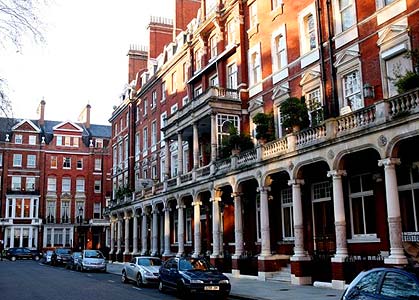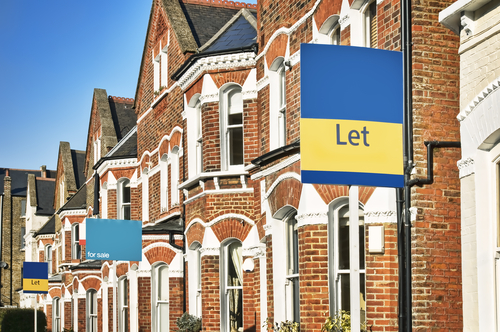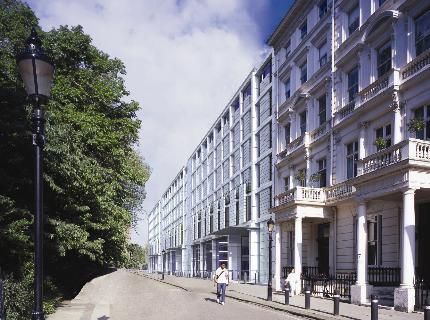507: Flooding of Printing Money and Housing Crisis Driving SE England Housing Market
04-27-2014

Housing Crisis: There has been a housing crisis in the UK for over ten years now. For decades now, the level of building new homes has been slowly declining whilst the population has been increasing sharply. In general, the closer to London you get, the more severe the shortage of properties.
The population is increasing the sharpest in London because of:
* New and existing businesses expanding and creating jobs
* Inward migration of overseas workers
* Younger people and immigrants tending to have larger-expanding families
No Council Housing: Very few council houses or flats are being built – for example – Hammersmith & Fulham have only built 54 homes in the last 4 years. This is partly because of borrowing limits set on councils that preclude them spending on new homes. Even though many councils would like to build more homes, they don’t because they have no spare funds, and they use all the funds to keep their jobs – it’s easier to not build a house than cut a job. They cannot expend – no money – simple.
Population Boom: London’s population is increasing by about 110,000 a year and London needs about 55,000 new homes being built each year – most of them affordable – and costing below £200,000 in price – just stand still. However, less than half of this amount of new homes has been built in the last ten years and these are almost exclusively luxury flats with prices over £500,000. Most people want a small house with a garden – a dream for most younger people living in London today.
Lower End of Market Boom: What this is doing is driving the lower end of the market upwards quickly in central London areas. It was only a year ago you could buy a one bedroom flat in New Cross for £130,000. But this is rapidly changing as first to buyers and buy-to-let investors compete for the lower end of the market and snap up these affordable homes before they get out of reach – sub £200,000 homes are becoming a thing of the past.
Help-to-Buy Boost: The introduction of Help-to-Buy certainly boosted demand, but it’s not expected to have a significant impact on supply. It’s certainly got the property market moving upwards. It coincided with the start of a big shift upwards in prices after March 2013 – and there seems little doubt it kick-started the housing market and may have even kick-started the whole UK economy in a confidence boosting manner.
Pensions Boost: The scrapping of pension annuity will also give the property market a big boost – since anyone age 55 years and over can access huge cash piles and choose to invest this in property for their main pension pot. Of course realistically this is certainly likely to happen and create a further boost to property prices – and it will drive down rental yields in the next few years. This pension pot money will perversely be used to snap up lower end properties for rental that the first time buyers are also looking to purchase – more competition on the lower end of the market in places like London and SE England.
No New Supply: Meanwhile on the supply side, we remain as sceptical as ever – we just don’t see large new supplies of properties coming on-stream, particularly sub £250,000 homes in London, because of:
* High land costs
* High building material and labour costs – and building skills shortages
* Very slow, expensive, risky, bureaucratic and time consuming planning processes
* Nimbyism stalling out developments
* Builders and banks being reluctant to take risk after the last financial crisis in 2008
* High taxes imposed by council and local authorities
* Threat of Labour winning the next election – with the introduction punitive taxes, rent controls and regulations on business
* Threat of land taxes and mansion tax from a future Labour government
* Threat of a property boom going bust in the time it takes to plan then build a property – normally a 3-10 year cycle with current planning processes – especially with Labour potentially coming to power in 2015
* Increased environmental and social costs and risks to building
No Affordable Homes: One can understand that affordable homes are not really profitable to build and often have opposition from local neighbourhoods. Yes, people probably want to see more homes being built, but not in their areas or back-yards. They certainly don’t like cheap homes and perversely also try and put a stop to mansions and really nice flashy homes.
 Garden Cities a Dream: All the talk of garden cities in our view is just pie in the sky – a vision – it was half a century since the last new town was built, and everyone thought they were a disaster at the time. There is not enough room or building land for garden cities. People on the one hand say they want more homes, on the other hand say they don’t want high rise properties, then they will complain about the density in low rise developments. It’s almost impossible to get planning permission to build even in brownfield areas – especially as taxes and funding for things like new schools, sewage upgrades and road improvement often kill off developments before they have even started.
Garden Cities a Dream: All the talk of garden cities in our view is just pie in the sky – a vision – it was half a century since the last new town was built, and everyone thought they were a disaster at the time. There is not enough room or building land for garden cities. People on the one hand say they want more homes, on the other hand say they don’t want high rise properties, then they will complain about the density in low rise developments. It’s almost impossible to get planning permission to build even in brownfield areas – especially as taxes and funding for things like new schools, sewage upgrades and road improvement often kill off developments before they have even started.
Market Broken for 15 years: The reason for describing this scepticism of a supply side boost is to describe the opportunity. When demand is boosted – as it has been by current government policy and a population boom, whilst being supply constrained by Nimbyism and planning rules, you will see house prices sky-rocketting. Which is exactly what is happening in London and SE England. Its worth pointing out that Labour in the period 1997-2010 presided over the biggest drop in home building for decades – and also hardly built any affordable housing, culminating in an all-time lowest level of home building around when the lost power. So it’s not going to change if Labour get back into power either – if anything, building levels will drop and rents will rise.
No One Moves Because of Tax: It’s also worth mentioning that in the mid 1960s, the average person moved house every 6.5 years. By 2007 this had risen to 18 years, and by 2014 it now stands at 22 years. Yes, people don’t move house for 22 years on average – almost a quarter of a century. The reasons are multiple:
* High moving costs (solicitors fees, estate agent fees, sellers packs etc)
* Better internet-communication, connectivity and flexible working allow people to work away from where they live, therefore meaning they don’t need to move home to work
* Stamp duty has skyrocketed making moving prohibitively expensive – particularly in SE England
* People live longer tending to stay where their family and friends are
* People try and avoid moving because of the huge financial risks-exposure – especially if the transaction falls through or goes wrong
* People preferring to extend homes up-down-laterally rather than move to avoid stamp duty
Tax Receipts Could Decline: Of course the un-intended consequence of the stamp duty tax is that less tax is collected because people are moving far less because of it. It makes mobility less, a less mobile workforce. But “telecommuting” and working away from home for say 4 days a week has help bridge this gap – helped by the England being a small country, densely populated with good transport links and major cities being commutable, meaning people can look further afield for work. As electric trains have got more reliable and faster, and cars more reliable and faster, with more flights within the UK available - it’s made commuting long distances more manageable. This has meant people have not needed to move home so often. This has been good for the stability of kids with schooling and family with friends – to the detriment of the person working the long distance being away from their spouse and children for extended periods. Overall, its helped people not need to move as often as in the 1960s.
People Staying Put - Hedging: This leads us onto why house prices are rising so rapidly. One can see that the average person will be holding onto their property – particularly if it is a nice house – and many people will be chasing nice houses. About 90% of properties being built are flats, so as the population expands and people want houses rather than flat, house prices will rise. Most people want a house with a garden – if they can afford it. So any house with a garden close to London – within easy commuting distance to central London - will see prices rise sharply. There are just too many families chasing too few houses – and no new houses being built. It’s not rocket science.
Housing Crisis Continues: This desperate housing crisis has been ongoing since we started this website  in 2005 and we have written about it constantly, but it’s now going into a different phase when everyone has finally woken up to the fact it’s a big issue for society and also politically. There are no easy answers given that 95% of the UK population are Nimbys (do you want a new housing development behind you home?). The economy of the UK and London in particularly is driven by talented motivated migrant workers with all different educations and skills and this has help drive population growth. With the benefits – economic expansion – come the outcomes – which are housing shortage and high property prices as authorities not planned for this expansion.
in 2005 and we have written about it constantly, but it’s now going into a different phase when everyone has finally woken up to the fact it’s a big issue for society and also politically. There are no easy answers given that 95% of the UK population are Nimbys (do you want a new housing development behind you home?). The economy of the UK and London in particularly is driven by talented motivated migrant workers with all different educations and skills and this has help drive population growth. With the benefits – economic expansion – come the outcomes – which are housing shortage and high property prices as authorities not planned for this expansion.
More Conflict Raises London Prices: The conflicts and instability around the world have also attracted a lot of the super-rich moving to London as a safe haven for their investment and families. This if anything is likely to accelerate. Not only is London relatively safe, its low tax, has excellent amenities, schools, universities, shops, tourism, night-life and culture-history with an equitable climate. Expect further influx over the summer months and into the winter working months. Yes, it will be overcrowded, booming with lots of jobs, but a massive shortage of properties and sky-high property prices.
Printed Money Flooding In: In the last few years, we have been warning about what will happen with all the printed money that was created from thin air. This was printed by the US and UK – then exported all around the world. A currency war. What happens eventually with this ultra-cheap – or no cost – currency, is it appears in the form of asset bubbles that appear in different places. Our belief is that this printed currency inflating property prices in London since it is in the hands of the ultra-rich that want to get their hands on real assets like property as a protection against financial collapse, turbulence or conflict – this could be deflation or inflation. They shift this cash into what they believe to be s afe assets. Yes, 7 billion people in the world and 0.5% are super-rich. That’s 35 million people. Even if only 10% of them were looking to shift cash into safe London property – that would be 3.5 million super-rich. The number of properties in prime London are only 250,000 – so it’s easy to see why property prices in prime London can skyrocket as Trillion of dollars are printed currency are being shuffled into real assets like London property.
afe assets. Yes, 7 billion people in the world and 0.5% are super-rich. That’s 35 million people. Even if only 10% of them were looking to shift cash into safe London property – that would be 3.5 million super-rich. The number of properties in prime London are only 250,000 – so it’s easy to see why property prices in prime London can skyrocket as Trillion of dollars are printed currency are being shuffled into real assets like London property.
Tax On Prime Will Lead to Stagnant Upper End: Now the Coalition has put capital gains taxes for foreign owners of companies that buy UK property and threaten a Mansion Tax on properties worth over £2 million, we will likely see Prime London property prices plateauing for a while, possibly declining slightly. But these same super-rich will simply start buying properties in Zones 2 and 3 as the ripples moves out rapidly and properties in the range £200,000 to £1,200,000 in value shift upwards sharply. We will see 3-bedroom terraces in Battersea shift from £1.2 to 1.5 mln in short order, and 1 bedroom flats in Peckham move from £230,000 to £280,000 rapidly. All the printed currency is finding a home in London property prices – hardly surprizing.
Supply Constraint: The indigenous UK population and all the foreigners coming in are no stupid – they know that supply side constraints on the lower and middle parts of the London and SE England property markets will continue. They know no-one is building Georgian, Edwardian and Victorian terraces houses in Central London. They know the population is booming. This is one reason why so few Londoners want to sell any properties – they see prices continuing to rise through the next five years. The only risky area seems to be high-end high-rise luxury flats that will be flooding onto the market in the next three years – watch out if you plan to spend £3 million on one of these.
Possible Sharp Correction – Labour: Our view is that this could come to a grinding halt if Labour or a  Labour-Lib-Dem Coalition gets into power in May 2015, but for now, it seems pretty close to a one way ticket. However, its worth pointing out that if Labour penalised property owners in London, its likely to have a worse effect in places like Newcastle, Liverpool and Leeds – since these prices have hardly started to move yet and would be driven down to new lows – as London prices also dropped. More property and landlord regulation would also tighten the rental sector leading to higher rental prices as competition is driven away.
Labour-Lib-Dem Coalition gets into power in May 2015, but for now, it seems pretty close to a one way ticket. However, its worth pointing out that if Labour penalised property owners in London, its likely to have a worse effect in places like Newcastle, Liverpool and Leeds – since these prices have hardly started to move yet and would be driven down to new lows – as London prices also dropped. More property and landlord regulation would also tighten the rental sector leading to higher rental prices as competition is driven away.
Nothing Much Has Changed: If you also consider how much printed money resides in the hands of the top 0.5% global super-rich – and they want to shift it away from their home country to a city with good legal title – where assets cannot be seized. Let’s face it, the average person does not have access to this money with a 0.5% base rate – free money – it’s only the super-rich that can play with these funds. This is another key reason why floods of foreign money continues to funnel into London, driving wealthy UK citizens out of places like Kensington into Battersea, Clapham and Islington. It’s not really changed that much over the years – it’s just got more accentuated d and extreme. The same happened in the 1980s with oil money and 1990s with dot-com money. Now it’s global printed currency and the super-rich playgrounds.
We hope you have found this Special report insightful to frame your property investment decisions. If you have any queries, please contact us on enquiries@propertyinvesting.net

